ALPCO’s Insulin Chemiluminescence ELISA detects insulin at levels as low as 20 pg/mL in human serum, plasma, and β-islet tissue culture supernatants, without cross-reactivity to human intact proinsulin, mouse insulin, or rat insulin.
Insulin Chemiluminescence ELISA
The STELLUX® Chemi Human Insulin ELISA measures the concentration of insulin in human serum, heparin plasma, and tissue culture supernatants.
- Broad dynamic range of 5–30,000 pg/mL
- Superior sensitivity compared other products on the market.
- LOD: <2.0 pg/mL
- LLOQ: 20 pg/mL
The STELLUX® Chemi Human Insulin ELISA measures the concentration of insulin protein products and offers superior performance compared to other similar kits in the market. The assay utilizes a dual-monoclonal antibody sandwich format, tri-level control set, and 96-well microplate comprising removable strips. The assay can measure up to 37 samples in duplicate and can be used in a variety of sample types.
Broad Dynamic Range (5 – 30,000 pg/mL)
Significantly reduces sample preparation time by eliminating dilution steps and the guesswork involved in determining dilution factors, saving time and money. No guessing, no diluting, no repeating.
Sensitivity
Superior assay sensitivity compared to current competitive products on the market. LOD: <2.0 pg/mL, with a lower limit of quantification of 20 pg/mL.
One Assay to Fit All Sample Types
The assay works with human serum, heparin plasma and tissue culture supernatants.
Lot Validation Package
Lot validation includes functional sensitivity, inter- and intra-assay precision, accuracy, LLOQ , and ULOQ.







